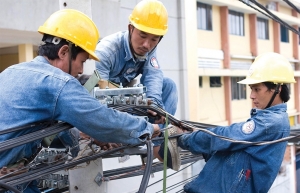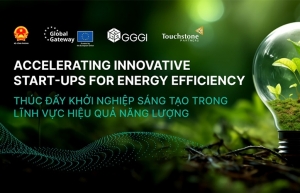Navigating Asia-Pacific’s renewable energy landscape
 |
| Arnaud Ginolin, managing director and partner Boston Consulting Group (left) and Suncica Zdunic, project leader Boston Consulting Group |
Asia-Pacific’s vast potential and diverse market dynamics present significant opportunities and unique challenges for renewables developers, investors, and operators. These complexities are examined in our latest report, “Asia-Pacific is Ready for Renewables. Are Energy Players?”.
Navigating this complex landscape demands a nuanced understanding of each market’s intricacies and a strategic approach tailored to local conditions. Achieving substantial renewable energy integration will require significant investment. According to the International Energy Agency’s announced pledges scenario, revised in August 2023, investments in Asia-Pacific renewables from 2022 to 2030 are projected to reach $286 billion.
Vietnam’s rapid growth and national commitments to expand renewable energy capacity make it an intriguing market for low-carbon energy evolution in Southeast Asia, with wind and distributed solar technologies providing a valuable platform for sustainable success.
The promise of renewables in Vietnam
Vietnam is a nation with growing energy demand, driven by rapid population and economic growth. The national economy is projected to grow to nearly 6 per cent in 2024 – far above the global average and outstripping many regional peers. The readjustment of global supply chains from China towards Southeast Asia is further bolstering the nation’s economic opportunity, creating fertile ground for renewables investment.
The country has a strong foundation of renewable energy, with installed energy capacity of over 46,000MW as of 2023 – marking it as a regional leader by total installed renewable capacity.
There are strong national commitments designed to further expand on this foundation, with Vietnam setting targets to achieve net-zero by 2050.
The Power Development Plan VIII targets generating approximately 27 per cent from wind and solar by 2030, with approximately half coming from hydropower, gas, and other lower-carbon sources. It aims to phase out coal completely by 2050, with gas power plants converted to ammonia, hydrogen, and liquid-natural gas. Wind, solar, and hydropower are targeted to account for the greatest share of the future power mix.
Vietnam’s participation in the Just Energy Transition Partnership also positions it to benefit from significant foreign direct investment to support the nation’s low-carbon energy ambitions. In total, Vietnam’s roadmap to significantly expand renewable energy generation is expected to deliver an additional 26GW of wind and solar capacity.
Charting a course for success
Renewable energy development in Vietnam – and across Asia-Pacific – is driven by several key elements, each adding momentum towards a sustainable energy future. One significant driver is cost reduction. Advances in technology and economies of scale have made renewable energy increasingly competitive with traditional fossil fuel-based power generation. This cost parity, particularly in solar, has accelerated the adoption of renewables in Asia-Pacific, driving investment and deployment of clean energy infrastructure.
In navigating the renewable energy landscape across Vietnam and Asia-Pacific, developers and investors must adapt to the diverse business environments present in each market.
We have identified five key factors for both developers and investors to consider: finding focus by concentrating efforts on specific markets and technologies, establishing local partnerships to access land and navigate regulatory landscapes, broadening financing options to address challenges of lower returns and increased competition, navigating the supply chain by integrating with local players and meeting local content requirements, and leveraging offtake expertise to gain a competitive edge in tender processes.
Vietnam’s high-growth economy and robust transition commitments provide an intriguing opportunity for energy players, and a valuable foundation for future industry growth. It is important for stakeholders to consider their positions now, and build a strong platform that enables them to take advantage of the projected acceleration in renewables tech.
Distributed solar power is emerging as a compelling opportunity due to low capital costs and established local presence in solar panel manufacturing. There is potential for further market growth driven by corporate demand. The enthusiasm for such projects will be heavily influenced by the recently approved direct power purchase agreement (DPPA) pilot.
Under this scheme, large consumers with monthly consumption of over 500,000kWh will have the opportunity to procure renewable energy directly from producers, creating fertile ground for distributed solar installation.
Vietnam also has official targets to push growth in both on-shore and offshore wind energy, although grid capacity constraints and congestion issues are likely to dictate the timeline. These grid challenges mean internal rates of return are currently low for renewables, at less than 5 per cent on average.
Offshore wind is expected to become a priority after 2030 with a promising export potential to other ASEAN countries. There is already conditional approval from Singapore’s energy regulator to import 1.4GW of low-carbon energy from Vietnam, predominantly powered by offshore wind, to mitigate the nation’s own energy limitations.
Despite the opportunities, investors in Vietnam’s renewable energy market face challenges. Adapting to market dynamics while maintaining financial viability and sustainability requires agility, foresight, and an in-depth understanding of local market conditions.
However, important efforts to address these issues are underway. In partnership with Vietnam Electricity, the government is focusing investment on enhancing grid infrastructure through championing investment in suitable energy storage solutions to support integration of variable renewable energy into the expanding power system, while enhancing power system flexibility. The DPPA pilot and market liberalisation efforts also provide important signals to potential investors, although the former must address outstanding implementation questions around financial dynamics for virtual DPPAs.
Vietnam has an important platform with existing capacity, strong commitments, and government backing to drive growth. Developers and investors should look to build robust early foundations, supported by local partnerships, to secure an early-mover advantage with potential for higher returns in the long term.
 | Feasibility is a must for successful DPPA mechanism A July government decree permits many kind of renewable energy projects to engage in direct power purchase agreements without using Vietnam Electricity transmission line. Tran Dang Khoi, general director of Hero Future Energies Vietnam LLC under Hero Group, told VIR’s Oanh Nguyen about the impact of the policy on renewable energy firms and offered some proposals. |
 | DPPA paves the way to energy transition Direct power purchasing mechanisms pave the way for manufacturers to accelerate their emission reduction strategies by expanding the procurement of renewable energy. |
 | Accelerator programme for energy efficiency kicks off in Vietnam Applications are now open for a first-of-its-kind accelerator programme for energy efficiency in Vietnam. |
What the stars mean:
★ Poor ★ ★ Promising ★★★ Good ★★★★ Very good ★★★★★ Exceptional
Related Contents
Latest News
More News
- Trung Nam-Sideros River consortium wins bid for LNG venture (January 30, 2026 | 11:16)
- Vietnam moves towards market-based fuel management with E10 rollout (January 30, 2026 | 11:10)
- Envision Energy, REE Group partner on 128MW wind projects (January 30, 2026 | 10:58)
- Vingroup consults on carbon credits for electric vehicle charging network (January 28, 2026 | 11:04)
- Bac Ai Pumped Storage Hydropower Plant to enter peak construction phase (January 27, 2026 | 08:00)
- ASEAN could scale up sustainable aviation fuel by 2050 (January 24, 2026 | 10:19)
- 64,000 hectares of sea allocated for offshore wind surveys (January 22, 2026 | 20:23)
- EVN secures financing for Quang Trach II LNG power plant (January 17, 2026 | 15:55)
- PC1 teams up with DENZAI on regional wind projects (January 16, 2026 | 21:18)
- Innovation and ESG practices drive green transition in the digital era (January 16, 2026 | 16:51)

 Tag:
Tag:



















 Mobile Version
Mobile Version